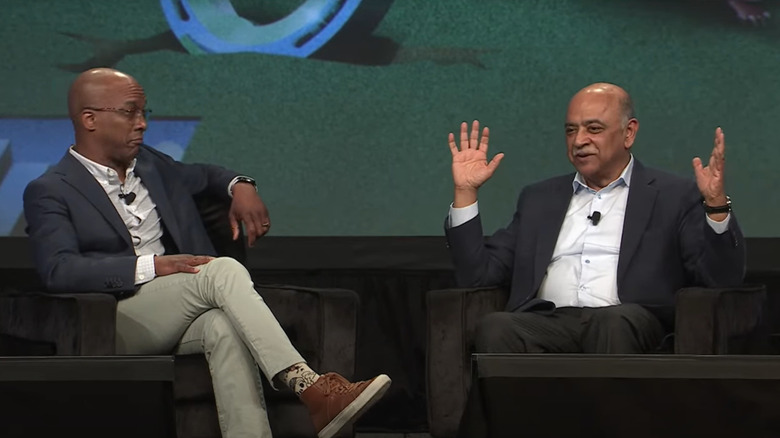These Big Tech CEOs Think A 3-Day Work Week Is Coming, Thanks To AI
The history of artificial intelligence is driven forward by the loud drumbeat of progress echoing from every corner of the economic sphere: AI will make you more efficient! More effective! And, probably, unemployed! Of course, no one is a greater proponent of AI than the executives set to capitalize on it. And while some have warned workers of the fallout of these changes, most agree that the AI train is coming, and workers can either hop on or move out of the way.
One vector that has executives excited is the possibility of reduced workweeks, with CEOs touting AI-induced efficiency gains as giving workers back their time. This possibility reentered the news sphere in September 2025 when Eric Yuang, CEO of Zoom, told the New York Times that "every company will support three days, four days a week. I think this ultimately frees up everyone's time." These comments reflect a sentiment parroted by tech CEOs across op-eds and podcasts. For instance, Bill Gates has touted the possibility of an AI-induced 3-day workweek for years while simultaneously warning that the technology will replace jobs previously thought AI-proof, like doctors and teachers. Nvidia CEO Jensen Huang, meanwhile, has likened AI to the industrial revolution, once telling Fox Business' Liz Claman that progress inevitably "leads to some change in social behavior," with companies "probably" transitioning to four-day workweeks. Vermont Senator Bernie Sanders and JPMorgan CEO Jamie Dimon have also discussed AI sparking shorter workweeks.
Whether AI will reduce the workweek is hotly debated, as some observers, like Anthropic CEO Dario Amodei, say mass automation will likely cut jobs, particularly for entry-level workers, while others question the initial premise of AI-induced efficiency gains.
The productivity paradox
Unfortunately, the jury is still out on whether AI will deliver major jumps in productivity, due in part to a murky data environment that struggles to define and measure efficiency. For instance, a 2025 study of Procter & Gamble employees found that individuals equipped with AI could mimic the output of two without it. However, a recent survey by freelance platform UpWork found that three-quarters of workers thought AI tools negated efficiency gains by substantially increasing workloads. Researchers at Harvard and Stanford suggest this may be because employees now dedicate significant time to revising "AI Workslop." This was echoed by a new study by the nonprofit METER, which saw coders using AI vibe coding tools take roughly 20% longer than their manual counterparts.
Meanwhile, companies have struggled to connect AI incorporation with productivity. A June 2025 McKinsey & Company report showed 80% of companies deploying generative AI models had yet to increase profit margins. A July 2025 MIT report is even more damning, with 95% of enterprise AI programs considered failures. Another 2025 Center for Economic Studies report explains this "productivity paradox" by finding that the success of AI initiatives follows a "J-curve," with companies experiencing initial productivity downturns before improvements.
Such reports necessitate patience while building organizational know-how, technological competency, and individual trust in AI applications. Whether businesses can withstand this long productivity on-ramp is a concern. A 2025 study published by Scientific Reports showed that AI users lose motivation and experience boredom at work, while a May 2025 survey by workforce planning platform Orgvue found that 34% of companies saw employees quit because of AI. Some believe that shorter workweeks may offset employee dissatisfaction. Luckily for employees, a 2024 report by Tech.co stated that 93% of AI-adoptive businesses were open to four-day workweeks.
Reducing hours or workers?
Another question is whether AI efficiencies are more likely to result in shorter workweeks or smaller workforces. Early returns have been mixed on the subject. The previously mentioned Orgvue study showed that 40% of businesses had laid off employees because of AI. However, over half of those companies reported regretting the decision. A May 2025 survey by financial tech platform Mercury found that 79% of startups with significant AI adoption rates reported the technology had prompted them to hire more employees, not fewer. This is in stark contrast to non-AI adopters, where only 13% were found to be actively scaling their teams. Together, the studies suggest a paradigm shift in which companies may begin viewing AI tools as supplementing human work rather than replacing it.
Anecdotal evidence further muddies the picture, as several high-profile examples show companies replacing workforces with AI tools. Klarna, for instance, cut roughly a quarter of its workforce in favor of AI programs in 2023, with CEO Sebastian Siemiatkowski claiming in an interview with Bloomberg that AI "can already do all of the jobs that we as humans can do." Two years later, quality concerns forced Klarna to walk back much of its AI push. The example of IBM, meanwhile, may bridge the gap between these two narratives, as its CEO, Arvind Krishna, told the Wall Street Journal in May 2025 that the company's AI initiatives caused the layoff of 200 HR workers while sparking the hire of more programmers and salespersons.
Ultimately, whether AI sparks a reduced workweek will depend on how companies decide to deploy AI's efficiency gains. As Nvidia's Huang told Fox's The Claman Countdown, AI may make companies "busier" than ever, as "the more productive we are, the more opportunity we get to go pursue new ideas."


